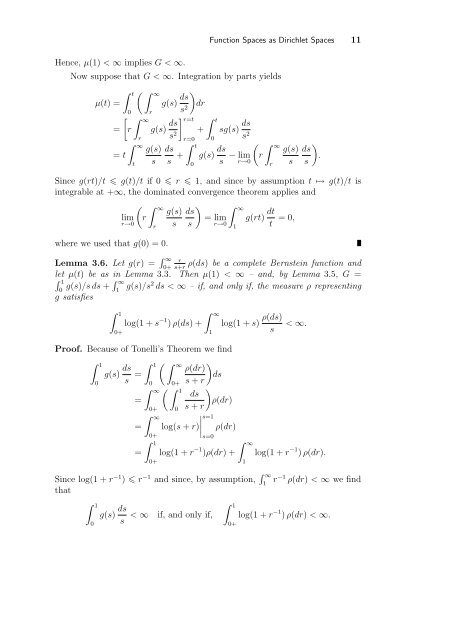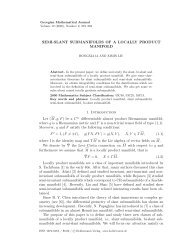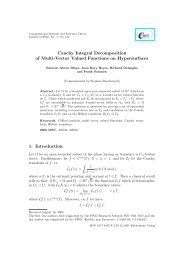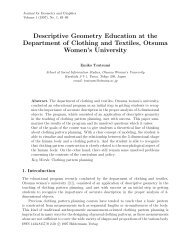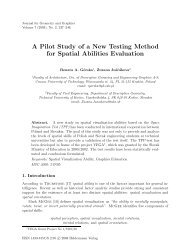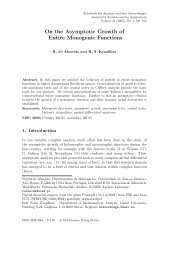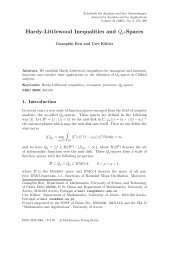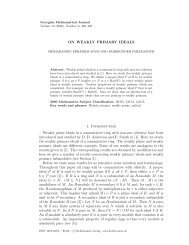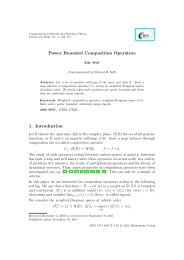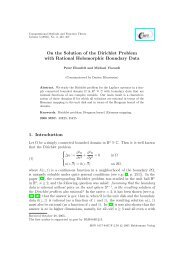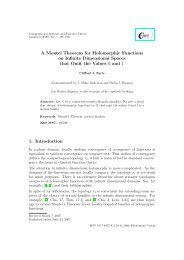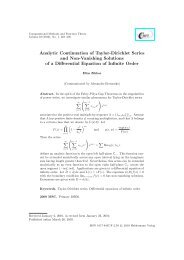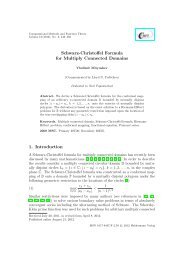Function Spaces as Dirichlet Spaces (About a Paper by Maz'ya and ...
Function Spaces as Dirichlet Spaces (About a Paper by Maz'ya and ...
Function Spaces as Dirichlet Spaces (About a Paper by Maz'ya and ...
Create successful ePaper yourself
Turn your PDF publications into a flip-book with our unique Google optimized e-Paper software.
Hence, µ(1) < ∞ implies G < ∞.<br />
Now suppose that G < ∞. Integration <strong>by</strong> parts yields<br />
µ(t) =<br />
=<br />
= t<br />
∫ t<br />
( ∫ ∞<br />
0 r<br />
∫ ∞<br />
[<br />
r<br />
r<br />
∫ ∞<br />
t<br />
g(s) ds<br />
s 2 )<br />
dr<br />
g(s) ds<br />
s 2 ] r=t<br />
g(s)<br />
s<br />
r=0<br />
∫<br />
ds t<br />
s +<br />
0<br />
+<br />
<strong>Function</strong> <strong>Spaces</strong> <strong>as</strong> <strong>Dirichlet</strong> <strong>Spaces</strong> 11<br />
∫ t<br />
0<br />
sg(s) ds<br />
s 2<br />
g(s) ds<br />
s − lim<br />
r→0<br />
( ∫ ∞<br />
g(s)<br />
r<br />
r s<br />
)<br />
ds<br />
.<br />
s<br />
Since g(rt)/t g(t)/t if 0 r 1, <strong>and</strong> since <strong>by</strong> <strong>as</strong>sumption t ↦→ g(t)/t is<br />
integrable at +∞, the dominated convergence theorem applies <strong>and</strong><br />
( ∫ ∞<br />
) ∫<br />
g(s) ds<br />
∞<br />
lim r<br />
= lim g(rt) dt<br />
r→0<br />
r s s r→0<br />
1 t = 0,<br />
where we used that g(0) = 0.<br />
Lemma 3.6. Let g(r) = ∫ ∞ r<br />
ρ(ds) be a complete Bernstein function <strong>and</strong><br />
0+ s+r<br />
let<br />
∫<br />
µ(t) be <strong>as</strong> in Lemma 3.3. Then µ(1) < ∞ – <strong>and</strong>, <strong>by</strong> Lemma 3.5, G =<br />
1<br />
g(s)/s ds + ∫ ∞<br />
g(s)/s 2 ds < ∞ – if, <strong>and</strong> only if, the me<strong>as</strong>ure ρ representing<br />
0 1<br />
g satisfies<br />
∫ 1<br />
0+<br />
log(1 + s −1 ) ρ(ds) +<br />
∫ ∞<br />
1<br />
log(1 + s) ρ(ds)<br />
s<br />
< ∞.<br />
Proof. Because of Tonelli’s Theorem we find<br />
∫ 1<br />
g(s) ds ∫ 1<br />
( ∫ ∞<br />
)<br />
0 s = ρ(dr)<br />
ds<br />
0 0+ s + r<br />
∫ ∞<br />
( ∫ 1<br />
)<br />
ds<br />
=<br />
ρ(dr)<br />
0+ 0 s + r<br />
∫ ∞<br />
s=1<br />
= log(s + r)<br />
∣ ρ(dr)<br />
=<br />
0+<br />
∫ 1<br />
0+<br />
s=0<br />
log(1 + r −1 )ρ(dr) +<br />
∫ ∞<br />
1<br />
log(1 + r −1 ) ρ(dr).<br />
Since log(1 + r −1 ) r −1 <strong>and</strong> since, <strong>by</strong> <strong>as</strong>sumption, ∫ ∞<br />
1<br />
r −1 ρ(dr) < ∞ we find<br />
that<br />
∫ 1<br />
0<br />
g(s) ds<br />
∫ 1<br />
s < ∞ if, <strong>and</strong> only if, log(1 + r −1 ) ρ(dr) < ∞.<br />
0+


